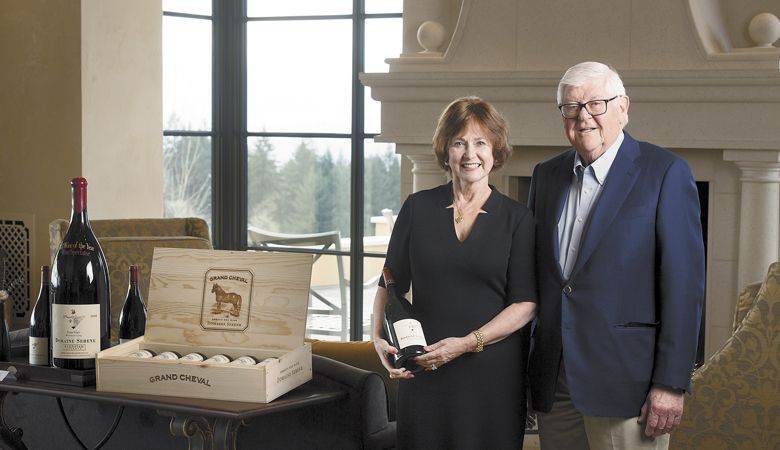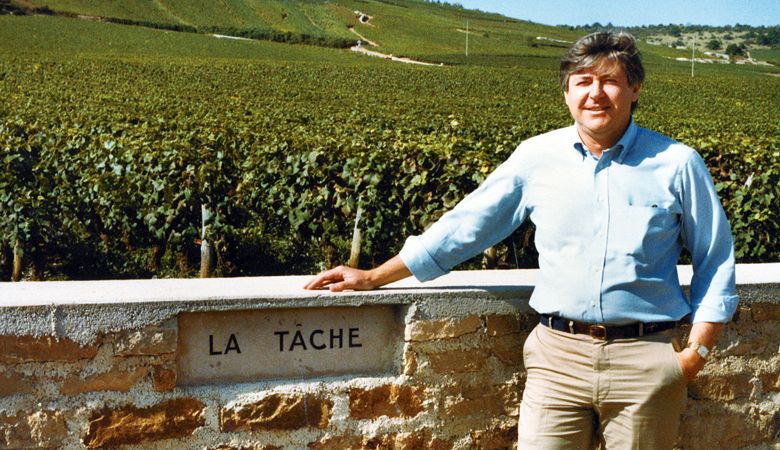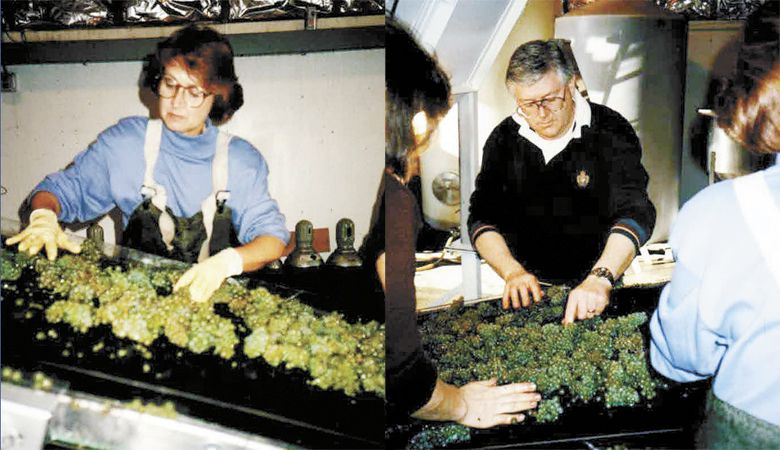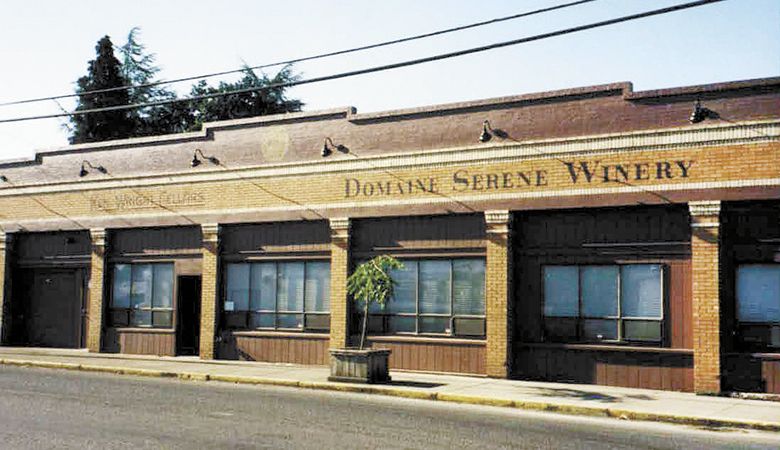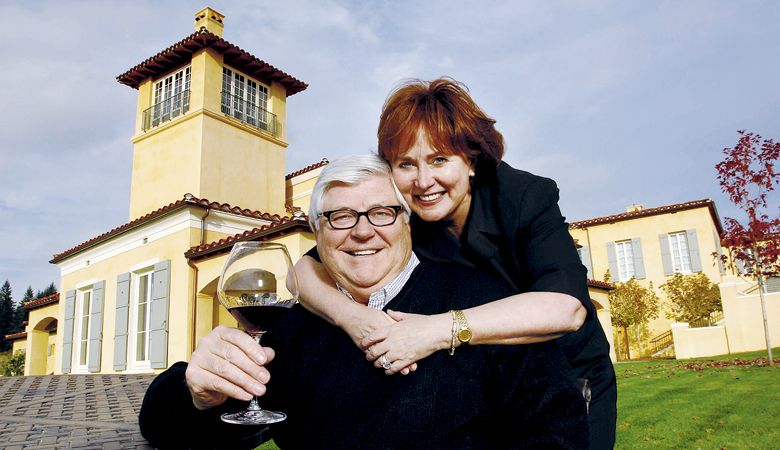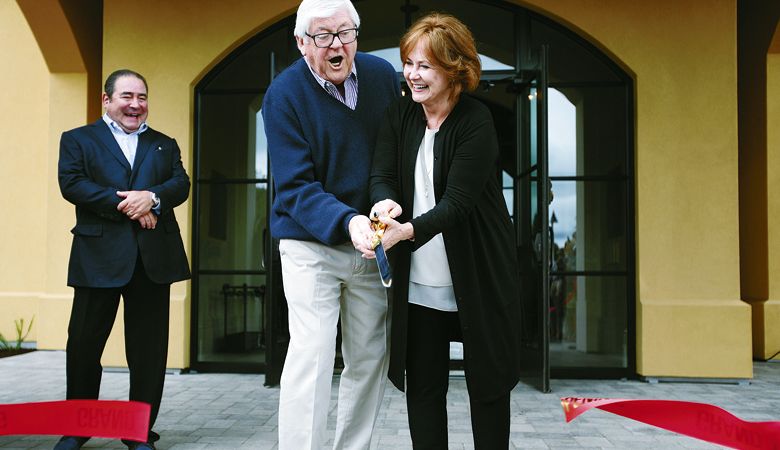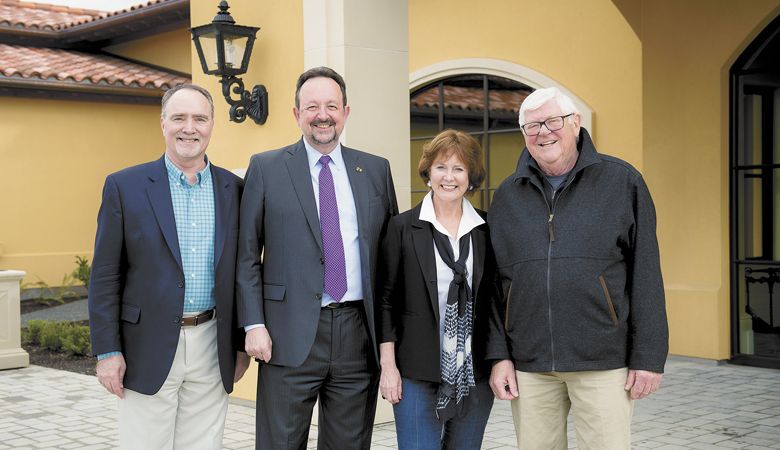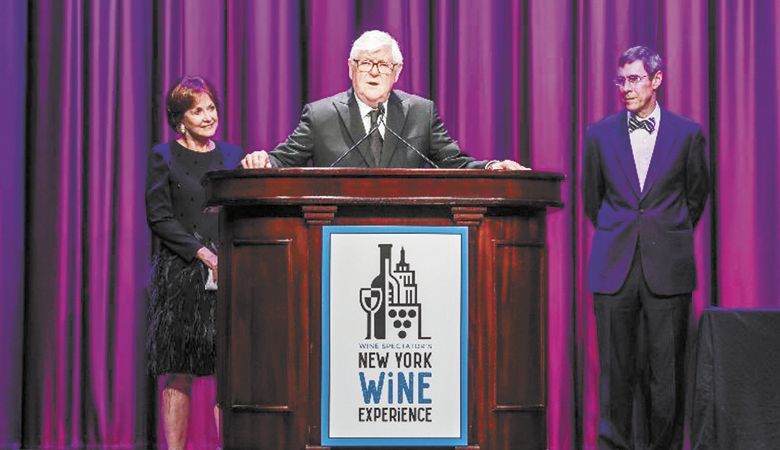2020 OWP Persons of the Year: Grace & Ken
Evenstads define Oregon wine luxury, impact local community and beyond
By Annelise Kelly
Reviewing the trajectory of the Oregon wine industry over these past few decades, it’s hard to overstate the influence of Grace and Ken Evenstad, and Domaine Serene, the winery they founded in 1989. As the Willamette Valley wine community continues to mourn Ken’s recent passing in October, Oregon Wine Press would like to celebrate the Evenstads with the OWP 2020 Persons of the Year award. Their tremendous impact on Oregon wine culture and their rich legacy are undeniable.
The Evenstads and Domaine Serene deserve acknowledgment for establishing the Oregon luxury wine market and pushing the boundaries in the ’90s to sell Oregon Pinot Noir to markets across the U.S. and around the globe, capturing palates and the attention of critics and consumers. In addition to crafting some of the finest wines in Oregon, they also founded and funded the Evenstad Center for Wine Education at Linfield University in McMinnville; generously contributed to philanthropic efforts; accumulated scores of awards; and bought a historic Côte d’Or wine estate.
The Oregon wine industry has pursued an incredible journey, from scrappy startup to today’s global renown. Credit belongs to so many who, convinced of Oregon’s potential, planted vines, harvested, pressed, processed and pampered in an ongoing search for excellence. Certain cultural landmarks punctuate the evolution of Oregon wine into a respected international player. Often told is the tale of The Eyrie Vineyards’ Oregon Pinot Noir nabbing an international medal in 1979, commanding the attention of oenophiles around the globe. In 2004, Domaine Serene realized a similar feat, further cementing the reputation of Oregon Pinot Noir on the world stage.
The Evenstad Origin Story
Their partnership began under serendipitous circumstances in 1966, when Ken was attending college at the University of Minnesota.
Grace’s roommate, Serene, enlisted her to attend the spring formal with Ken, when his date dropped out at the last minute. What began as a favor to Serene and a spontaneous blind date turned to romance and a lifetime of adventure. By the end of the dance, both were smitten. Within seven months, they started their married life together, eventually naming their daughter after the friend who brought them together. They would name their Oregon winery after their daughter and their first vineyard after their son, Mark Bradford Evenstad.
In the beginning, the couple experimented with wine. Grace explained, “We had both grown up in families where our parents didn’t drink in the house, so the whole concept of wine with food was new to us and very exciting. I love to cook and Julia Child was sort of my mentor. We quickly fell in love with Burgundian wines — Pinot Noir and Chardonnay.”
A Mission Manifested
The couple’s passion for these Old World wines eclipsed any interest in domestic wines, such as California Cabernets or Bordeaux. “We kept wondering why America was not making Pinot Noir,” Grace said. As they pursued this question, they learned that the varietal never seemed to take off in the U.S. Living in Minnesota, they had heard of only fledgling Oregon Pinot Noir efforts. When investigating the prospect of making world-class Pinot Noir in Oregon, they also wondered about national distribution.
“The wonderful winemakers in Oregon said, ‘Well, we’ve tried it, and it’s not possible to sell Pinot Noir out of state. Nobody really wants Oregon Pinot except Oregonians,’” Grace recalled. “Ken and I just thought, well, that’s a challenge. Let’s see what we can do.
“We decided maybe we should try it ourselves. At that point, I had some time because our kids were in college. Ken was still running his pharmaceutical company,” Grace explained. “He didn’t have a whole lot of time, but we decided we couldn’t wait any longer, that we might as well give it a whirl and see what happens. And we thought that Oregon was the place.” In fact, they did investigate the prospects in California, where a Pinot producer told them “if I had to do it again, I’d go to Oregon.”
Launching Domaine Serene
So in 1989, with Ken still extremely engaged in running his pharmaceutical company, the couple bought 42 acres in the Dundee Hills and found themselves in the winemaking business. Theirs was not a casual hobby. They launched with a tremendous ambition: To make the best Pinot Noir in Oregon and to craft wines good enough to compete with the best of Europe’s classic Old World wines.
They hit the ground running, making wine from contracted grapes and taking a hands-on approach. “I was working like a harvest intern and learning everything I could: punching down and sorting lines, hand bottling and all this kind of stuff. And then the blending, designing labels and coming up with names for the wines. I was very excited. I thought it was very fun.”
The couple deserves acknowledgment for the courage of their convictions. Ken Wright, Domaine Serene’s first winemaker, told Wine Spectator, “There are many things about Ken that I admired. He dared to trust his palate, which told him that Pinot Noir from the Willamette Valley was world-class. That trust led to a serious investment in the Oregon wine industry that helped raise our visibility.”
Grace credits that conviction with their ability to sell their first vintages. “People have said, ‘How could you sell your wine across the United States when other producers couldn’t?’ But I think we knew Burgundies so well, and we knew there was a national market for Burgundy. And we knew when we tasted our wine, that it was so similar to Burgundy… It was that confidence that made it possible for me to sell it. “
Their commitment to quality paid off from day one. The Evenstads’ first release, a 1990 reserve, earned 90 points from wine critic Robert Parker Jr. “We went to New York, Boston, D.C., Chicago and Minneapolis, and we sold almost everything that we had of that very first vintage out of state — we sold less than 5% in Oregon. Within, I think, two vintages, we were in 16 different states. And the bad side of that was that Oregonians didn’t really know we were there, but people knew us across the country. But we actually established national distribution for Oregon Pinot Noir, and it wasn’t long before others followed us. And that’s a great thing. I mean, Oregon Pinot should be enjoyed by everybody in the U.S.”
A Monumental, Lasting Impact
The Evenstads also led the way in establishing the Oregon luxury market. “We came in with pricing higher than anybody else,” Grace said. “And we have just focused like a laser on quality.” Placing their bottles in celebrated restaurants like Charlie Trotter’s in Chicago and Daniel in New York telegraphed a succinct message to the wine world: Oregon had arrived.
In a bold move that paid off, Domaine Serene went head-to-head with Domaine de la Romanée-Conti, a French estate whose wines are among the best and most expensive in the world. In a 2004 blind taste test by international master sommeliers and wine buyers, Domaine Serene repeatedly bested the French winery.
The Evenstads deserve great credit for “their focus on high-end hospitality,” too, according to Greg Jones, director of the Evenstad Center for Wine Education at Linfield. “When I went to their clubhouse, I really didn’t feel like I was in Oregon. It was amazing, like some gorgeous setting from a really well-known wine region showed up in our backyard. It was just so well thought through, an amazingly beautiful place.”
The sprawling Clubhouse at Domaine Serene in Dayton remains a vision of luxury. The Tuscan-style villa crowns a hilltop, with multiple tasting rooms opening onto a spacious patio overlooking the Willamette Valley. Downstairs, arched cellars with limestone walls evoke Old World châteaux. Wine lounges in Portland, Lake Oswego, and soon-to-open in Bend share a similar understated, classic atmosphere.
In 2015, the Evenstads leveraged their winery’s excellent reputation to buy a historic French estate, Château de la Crée. “We felt like we were the luckiest people in the world. It had been a dream of ours to make wine in the Côte d’Or in Burgundy,” Grace explained. “We feel like the French do about these vineyards, that we are just the shepherds of the vineyards for our generation.”
Domaine Serene continues its focus on quality while remaining committed to sustainability and to serving as a vehicle for the Evenstads’ social conscience. They’ve employed dry farming techniques and allowed a large percentage of their land to remain native, uncultivated habitat. All their wines are LIVE certified, ensuring their treatment of both human and natural resources is third-party certified to the highest standard.
The Evenstads’ dedication to the wine community and community as a whole is demonstrated by their philanthropy. With an effort to train the next generation of industry leaders while increasing diversity, the couple contributed graciously to establish America’s first and only multi-disciplinary undergraduate wine education program in the Evenstad Center for Wine Education at Linfield. Thanks to their patronage, Linfield is getting ready to add a new building. Jones noted, “Part of it will be the Evenstad Wine Laboratory, allowing us to give students hands-on experience in fruit and wine chemistry and sensory evaluation.”
Philanthropy remains an integral part of the history at both Domaine Serene and Château de la Crée. Wine and winery experience donations to date have raised millions for charities nationwide. In addition, the Evenstads have donated their time and resources to many high-profile wine auctions nationally; they have been honored as featured vintners at The Naples Winter Wine Festival, Destin Charity Wine Auction Foundation, Tum Tum Tree Foundation, Classic Wines Auction, High Museum of Art and Carnivale du Vin.
Three decades of ambition, hard work and passion created one of Oregon’s iconic wineries. Grace remains committed to Domaine Serene, as are her children and grandchildren, and to the continuation of a tremendous legacy of this incredible family.


